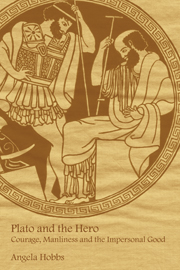Book contents
- Frontmatter
- Contents
- Acknowledgements
- Preface
- Glossary
- 1 The puzzle of Plato's thumos
- 2 Thumos, andreia and the ethics of flourishing
- 3 Arms and the man: andreia in the Laches
- 4 Odd virtue out: courage and goodness in the Protagoras
- 5 Why should I be good? Callicles, Thrasymachus and the egoist challenge
- 6 Heroes and role models: the Apology, Hippias Major and Hippias Minor
- 7 The threat of Achilles
- 8 Plato's response: the valuable as one
- 9 Alcibiades' revenge: thumos in the Symposium
- Epilogue: The weaver's art: andreia in the Politicus and Laws
- Bibliography
- Index
1 - The puzzle of Plato's thumos
Published online by Cambridge University Press: 01 October 2009
- Frontmatter
- Contents
- Acknowledgements
- Preface
- Glossary
- 1 The puzzle of Plato's thumos
- 2 Thumos, andreia and the ethics of flourishing
- 3 Arms and the man: andreia in the Laches
- 4 Odd virtue out: courage and goodness in the Protagoras
- 5 Why should I be good? Callicles, Thrasymachus and the egoist challenge
- 6 Heroes and role models: the Apology, Hippias Major and Hippias Minor
- 7 The threat of Achilles
- 8 Plato's response: the valuable as one
- 9 Alcibiades' revenge: thumos in the Symposium
- Epilogue: The weaver's art: andreia in the Politicus and Laws
- Bibliography
- Index
Summary
The Life of Reason and the Life of Desire
In Plato's early dialogue the Gorgias, Socrates and his interlocutor Callicles debate what Socrates says is the most important question of all: how one should live. Socrates argues for the philosophic life, in which one's desires are ordered by reason; Callicles advocates the life of the forceful man of affairs, who as far as possible acts as he pleases both in public and private. Underlying their differences lies an implicit disagreement about the nature of the self. While both appear to believe that the human personality consists of two main aspects, reason and the desires, Socrates seems to identify himself with the former, whereas Callicles identifies himself with the latter. Thus for Socrates freedom and happiness depend on the desires' obedience to reason, while for Callicles freedom and happiness depend on reason's obedience to the desires. Callicles is adamant that it is his view of human nature that is correct: the philosopher is a pathetic creature who is entirely ignorant of human pleasures and desires and the characters of men. When Socrates asks whether Callicles agrees that those who need nothing are happy, Callicles scathingly replies that if that were true then stones and corpses would be happiest of all. Impasse appears to have been reached. Although Callicles later formally capitulates to Socrates, he also claims that he is only agreeing with him so that the discussion may be brought to a speedy conclusion.
- Type
- Chapter
- Information
- Plato and the HeroCourage, Manliness and the Impersonal Good, pp. 1 - 49Publisher: Cambridge University PressPrint publication year: 2000

